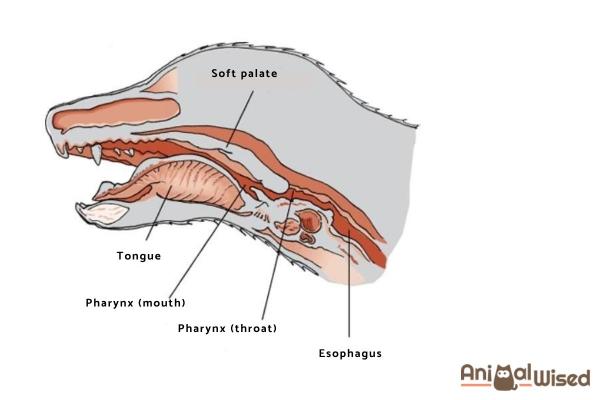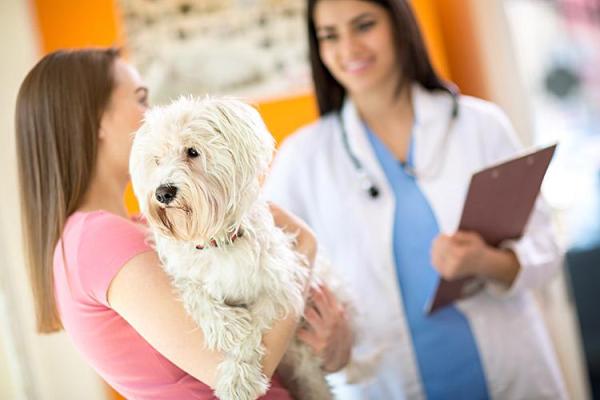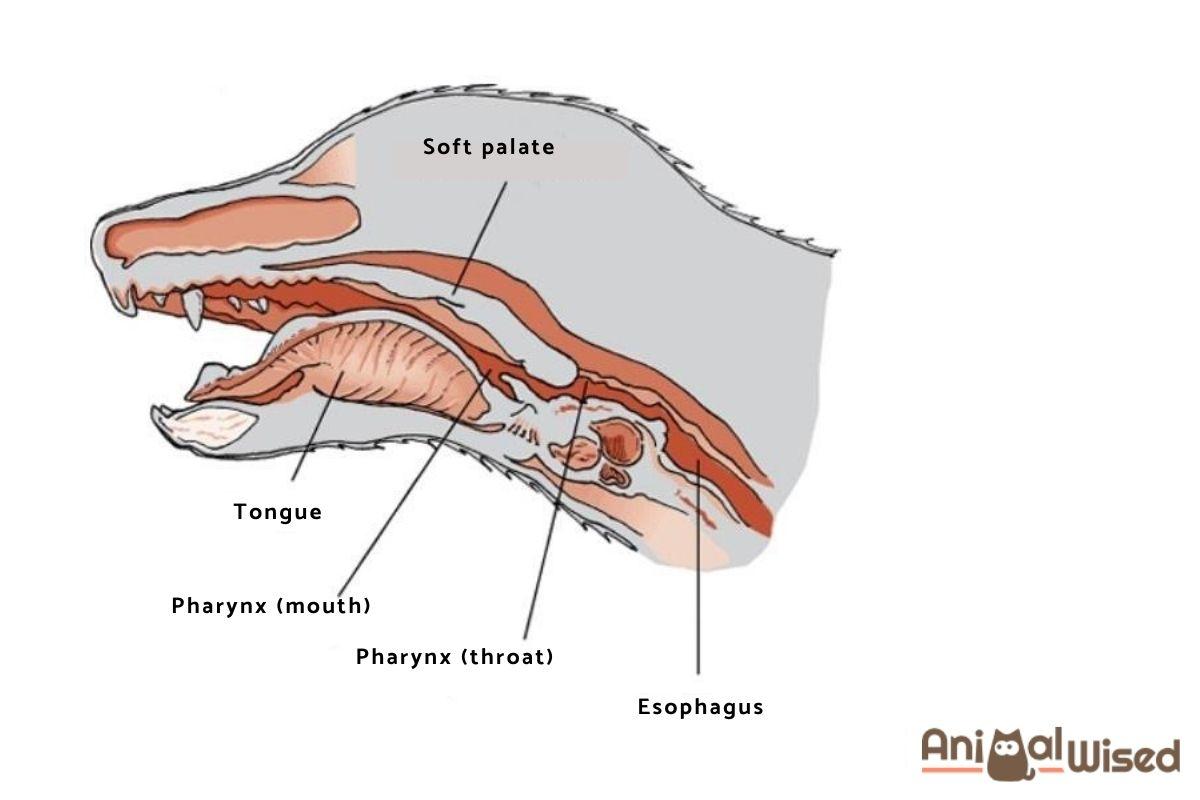My Dog has a Swollen Throat



See files for Dogs
It can be difficult to tell when a dog has a swollen throat. A dog's morphology means they have a horizontal body position with their neck and spine in alignment. They need to have strong neck muscles to support their head and to protect their throat. For this reason, when we see swelling in the throat it might be only once it has progressed significantly or when we see other signs of the underlying cause. The pharynx is the word for the area at the back of the throat and pharyngitis is when this area becomes inflamed.
At AnimalWised, we explain why my dog has a swollen throat by looking at pharyngitis in dogs. We look at the causes, symptoms and treatment of this problem, but remind you a veterinarian is the only one who will be able to diagnose and treat your dog.
What is pharyngitis in dogs?
The pharynx is the area at the back of the dog's throat which connects the mouth and nasal passages. The tonsils are located in this area at the sides, just as they are in humans. Tonsils are made of lymphatic tissue and play a part in the dog's immune system.
When the pharynx is swollen, they are said to have pharyngitis. There are many different causes of pharyngitis in dogs with the resultant problems being more or less severe. Although the problem can be mild, it is still important to go to a veterinarian to rule out a dangerous pathology which has a swollen throat as a symptom.
It is common for the tonsils and pharynx to become inflamed at the same time, meaning they have concurrent tonsilitis and pharyngitis, respectively. We might suggest they have a problem with their throat if the dog makes gulping sounds. This is because the swelling causes difficulty swallowing. This can be life threatening if the inflammation restricts airways.

Causes of pharyngitis in dogs
Various causes can lead to a dog having a swollen throat. Some are associated with oral infections, while others can be related to the sinuses or respiratory tract. There are also systemic diseases such as canine distemper or canine parvovirus which can have a swollen throat as a symptom. The inflammation is usually due to a viral or bacterial infection, both primary and secondary.
Causes of pharyngitis in dogs include:
- Viral infection
- Bacterial infection
- Hoarseness from vocalization
- Foreign objects
- Vomiting
- Immunodeficiency diseases (e.g. hypothyroidism)
When a foreign object is lodged in the back of the throat, it can cause inflammation. Bacterial infection can occur as a secondary problem, especially if the mucus membranes are pierced. When the dog suffers from immunodepression, they are more susceptible to viruses and other diseases which can lead to a swollen throat. Also, when a dog vomits due to gastrointestinal upset, the gastric acid can cause the throat to become inflamed.
Sudden changes in temperature and drafts are predisposing factors for developing pharyngitis. The widespread custom of allowing the dog to travel by car with his head out the window is discouraged for this reason.
Symptoms of pharyngitis in dogs
Apart from the dog having a swollen throat, the following symptoms are common and characteristic of pharyngitis in dogs:
- Coughing and hoarseness
- Redness
- Pus
- Blood in saliva
- Nausea that can lead to vomiting
- Pain when swallowing
- Reduced appetite
- Hypersalivation
- Fever
When the dog develops fever, it can lead to lethargy and a reduction in activity. When a bacterial or viral infection occurs, it is common for there to be pus around the pharynx and/or tonsils. The infection can also lead to blood appearing in their spit. Since the blood is from the throat, it should be fresh. If you see darkened blood, it means there is a gastrointestinal problem.
Since blood coming from a dog's mouth, the presence of pus or any of the other symptoms described above can be related to serious illness, it is important we take the dog to a veterinarian as soon as we observe them. They will be able to to look at the overall clinical picture and determine the cause.

Treatment of pharyngitis in dogs
As we discussed at the beginning, canine pharyngitis can be associated with infections of the mouth, sinuses or respiratory tract. In cases of bacterial infection, the vet will likely prescribe an appropriate antibiotic treatment. If the infectious cause is unclear, a broad-spectrum antibiotic will be administered. All medications must be prescribed by a veterinarian. We should never medicate the dog ourselves. In addition, anti-inflammatories and cough suppressants may be required, depending on the symptoms.
Although treatment will be dictated by the veterinarian's recommendations, there are ways to help support the dog through their recovery. Since the swelling can make eating difficult, we should find ways to help them swallow. Until the swelling has reduced, it will be better to offer them wet food instead of dry feed. In cases where this is not possible, you can wet the dry feed with a little water and make it easier to swallow. To help them find the resultant porridge more palatable, you can add dog-friendly broth.
If the dog still has problems swallowing due to a swollen throat, we can warm it up a little in the microwave or on the stove. We can also make homemade food which they might find more palatable. They will always need to be healthy and appropriate for dogs, something you can learn more about in our article on the BARF diet for dogs.
Once our dog's diet is regulated, there are other ways to help a dog recover from a swollen throat. Firstly, we will need to ensure we keep them in a warm dry place as humidity and cold can help bacteria proliferate. We need to keep them out of the rain, walk them in fresh air and avoid bathing unless completely necessary. We also need to provide plenty of affection to help their mood.
If the swelling does not go down or the dog develops other symptoms, we need to take them to the veterinarian.

This article is purely informative. AnimalWised does not have the authority to prescribe any veterinary treatment or create a diagnosis. We invite you to take your pet to the veterinarian if they are suffering from any condition or pain.
If you want to read similar articles to My Dog has a Swollen Throat, we recommend you visit our Other health problems category.







